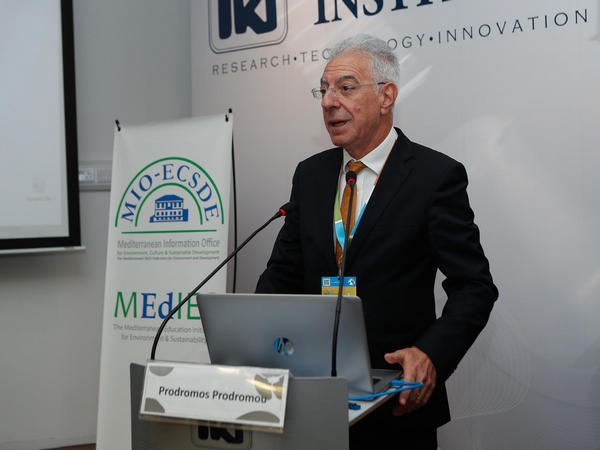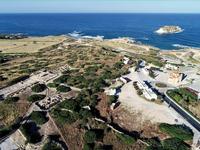Press Releases

05-10-2022 19:16
Speech by the Minister of Education, Sport and Youth, Mr Prodromos Prodromou, at the side event of the 9th Environment for Europe Ministerial Conference
“Higher Education towards Sustainable Development: Making Universities Lighthouses of Sustainability”
First of all, I would like to welcome you all here to this side event on “Higher Education towards Sustainable Development: Making Universities Lighthouses of Sustainability,” organized in the context of the 9th “Environment for Europe” (EfE) Ministerial Conference. The Republic of Cyprus is very proud and honored to be organizing this Conference, the first one of its kind to be held in a Mediterranean country, in cooperation with the United Nations Economic Commission for Europe.
Although the Conference’s focus is on the environment at large, I would like to emphasize that Education for Sustainable Development is in the spotlight, since it is widely recognized as an integral element of the 2030 Agenda for Sustainable Development, in particular Sustainable Development Goal 4 (SDG 4), and a key enabler of all the other 16 SDGs. Youth is also a topic of primary importance in the Conference’s agenda, since the new implementation framework of the UNECE (Economic Committee for Europe) Education for Sustainable Development Strategy 2021-2030, that will be adopted by the Ministers of Education during the Conference, aims to bring together the past with the future by actively engaging young people.
In the pursuit of sustainable development, Higher Education has a key role to play; a role that involves more than teaching about sustainability. In a historic moment that is internationally characterized by a series of crises at different levels (economic, political, cultural, institutional), Universities and Education in general, are influenced by challenges arising, but at the same time they become key contributors to efforts to overcome the crises and create a sustainable future.
I would like to emphasize that our universities, by definition and in practice institutions of dissemination of knowledge and scientific research in areas related to the natural sciences and the environment, and as they adopt multidisciplinary and multisectoral approaches, can have an important contribution in our efforts to initiate new approaches in ESD. Moreover, they play a crucial role in elaborating policies that aim to address complex and difficult issues and challenges related to the environment.
The “Strategy for Education for Sustainable Development”, adopted by the 56 member states of UNECE in 2005, invited Universities to considerably contribute to promoting Education for Sustainable Development by developing appropriate capacities and knowledge to reform their paradigms, through not only their teaching, but also their operation and governance. In doing so, the Whole Institution Approach is considered today an important tool for moving towards sustainability in a holistic way, encompassing teaching content and methodology and influencing the learning process, whilst embedding sustainability in all aspects of the institution including facilities, operations and creating interaction with stakeholders in the community, governance and capacity-building.
In this context, interesting programmes and initiatives on applying the tools and practices of such holistic approaches have been undertaken by the Institutions of Higher Education. Cypriot Institutions of Higher Education, in particular, have embraced their responsibility in the transition to a sustainable future, by embedding the principles of sustainability in their future development, internationalization, learning, teaching and research. For example, the University of Cyprus has set as its aim to become an exemplar in the area of sustainability, by becoming a role model for sustainable development in Cyprus, through its future expansion and its day-to-day operation. To date, it counts a number of success stories towards promoting SDGs in all aspects of academic life, including the pursuit of energy saving, the establishment of research centres that promote SDGs and the participation in developing and sustaining international partnerships.
Another example stems from the Cyprus University of Technology that in recent years has entered, even more dynamically, the fight against Climate Change by undertaking horizontal initiatives to improve the quality of life at the University and of society in general. In addition, at the Office of Environmental Policy which has been operating since 2011, coordinating the University’s Environmental and Sustainable actions, hybrid teams of Academic and Administrative Officers have been created in recent years, in order to expand these actions on the basis of the 17 SDGs.
A recent advancement in the field is related to the establishment of the Sustainable Development Solutions Network of Cyprus, which aims to handle very important parameters to achieve the 17 SDGs, such as collecting and disseminating best practices, raising public awareness and cooperating with youth, the private sector and civil society organizations, in order to achieve the integration of these goals in their daily activities. The list of members participating in this Network includes eight Institutions of Higher Education in Cyprus, NGOs and representatives from Cyprus’ public and private sectors.
Such networks, either national or at a European and international level, are important for the pursuit of sustainable development. As such, this side event which will discuss the upscaling of initiatives undertaken by Greek, Cypriot and other HEIs, the challenges they face and possible ways to overcome them, is a great opportunity for exchanging ideas, as well as promoting solutions and policies for sustainable development through the achievement of the17 Sustainable Development Goals.
With that said, I would like to thank and congratulate the organizer of this side event, the UNESCO Chair on Sustainable Development Management and Education in the Mediterranean at the University of Athens, along with our co-organizers, the Ministry of Education and Religious Affairs of Greece and the Mediterranean Universities network for Sustainable Development with emphasis on Education for Sustainable Development (ESD). I would also like to thank each one of you for your presence here today and wish you all a fruitful meeting.
(IP/NG)
Relevant Press Releases


22-11-2024 11:25
The “Royal Chapel” of Agia Aikaterini at Pyrga closed for the public





